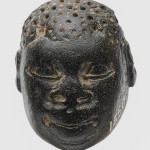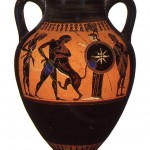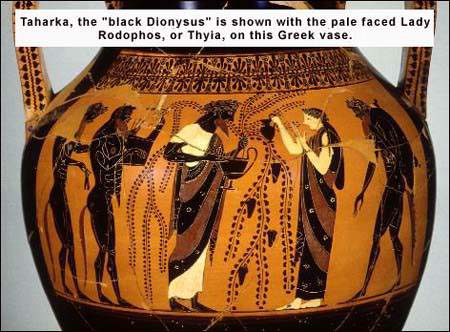
By Jide Uwechia with cited sources
The Benin Haplogroup or Haplogroup 19 Common in Africans, southern Greeks, Sicilians, and Albanians
There are at least four distinct African, (known as Senegal, Congo, Benin, Bantu Hbs Haplogroups) and one Asian chromosomal backgrounds (haplotypes) on which the sickle cell mutation has arisen.
The Benin haplotype (which originates from Nigeria, West Africa) accounts for HbS associated chromosomes in Sicily Northern Greece, Southern Turkey, and South West Saudi Arabia, suggesting that these genes had their origin in West Africa. The Asian haplotype is rarely encountered outside its geographic origin because there have been few large population movements and Indian emigrants have been predominantly from non HbS containing populations. Per:Graham R. Serjeant, MD, FRCP, The Geography Of Sickle Cell Disease:Opportunities For Understanding Its DiversityRSITY: http://www.kfshrc.edu.sa/annals/143/rev9239.html
Nigeria, west Africa appears the most logical origin of the sickle mutation in Greece evidence from beta S globin gene cluster polymorphisms (1991). It has been conclusively demonstrated that HbS in Greece is mostly haplotype #19 (the one that originated in Benin, Nigeria West Africa). See, Boussiou M, Loukopoulos D, Christakis J, Fessas P.; The origin of the sickle mutation in Greece; evidence from beta S globin gene cluster polymorphisms. Unit for Prenatal Diagnosis, Laikon Hospital, Athens, Greece.
Additionally, previous data suggest that the S/Bantu haplotype (from Southern Africa) is heterogeneous at the molecular level. Recent studies also report a similar heterogenity for the Benin Haplogroup. A study demonstrated the presence of the A -499 TA variation in sickle cell anemia chromosomes of Sicilian and North African origin bearing the S/Benin haplotype (from Nigeria). Being absent from North American S/Benin chromosomes, which were studied previously, this variation is indicative for the molecular heterogeneity of the S/Benin haplotype. Am. J. Hematol. 80:79-80, 2005.
A study was done in Albania (which borders Greece) relating to sickle cell anemia, sickle cell beta-thalassemia, and thalassemia major in Albania. The focus of the study was the characterization of sickle cell mutations. As one would expect, it was shown that the HbS mutation in the Albanian sample is the Benin (Nigeria)-originating haplotype #19. See, Boletini E, Svobodova M, Divoky V, Baysal E, Dimovski AJ, Liang R, Adekile AD, Huisman TH.; Sickle cell anemia, sickle cell beta-thalassemia, and thalassemia major in Albania: characterization of mutations. : Hum Genet. 1994 Feb;93(2):182-7.
According to a study done in 1973, before the availability of the advanced data cited above, “the occurrence of the sickle-cell trait in southern Europe …. is believed to reflect gene flow from the Middle East.” See A. P. GELPI, M.D, “Migrant Populations and the Diffusion of the Sickle-Cell Gene” August 1, 1973 vol. 79 no. 2 258-264 http://www.annals.org/content/79/2/258.abstract.
The problem with this 1973 study is that it assumes that the sickle cell genes came with the Arabs. Alas, updated research work has proven beyond doubt that the sickle cell genes proven to exist in southern Europe are exclusively Sickle cell gene Haplotype 19 or the Benin Sickle cell gene from Nigeria.
Y Haplogroup E-M78 and YAP In Black Africans and Greeks
Y Haplogroup E-M78 a derivative of E3B is a signature African gene as confirmed in research studies over the last few years. The high frequency of this haplogroup in Greece suggests the presence of a substantive African population in that region during prehistoric and historical time periods.
A recent paper has detected clades of haplogroups J and E3b that were likely not part of pre-historic migrations into Europe, but rather spread by later historical movements. Greeks .. [then there is] the marker J-M267, which may reflect more recent Middle Eastern admixture.
(Semino et al., Am J Hum Genet, 2004) E3b originates from East Africa while there is a high frequency of J-M267 in the East Coast of Africa as well as the Red sea coast of Arabia.
A recent sampling of the Greek population comprised 36 Peloponnesian samples, 5 of which were J-M172(xM12) and 17 of which were E-M78 (R.K., unpublished data).
In spite of the small Peloponnesian sample size, the high E-M78 frequency (47%) observed here is consistent with that (44%) independently found in the same region (Di Giacomo et al. 2003) for the YAP chromosomes harboring microsatellite haplotypes A. (Novelletto, personal communication) (Cruciani et al. 2004).
The study by by Di Giacomo et al. found the following African haplogroups in Greeks: Haplogroup A which is highly specific to West Africa, R1a, DE, and J2*(xDYS413= 18)J*(xJ2). R1* which probably gave rise to R1a is found in Northern Cameroon. DE is found principally among Nigerians and it is suspected that it originated from Nigeria. J is very prominent in East, and North Africa.
High-resolution Y-chromosome haplotyping and particular microsatellite associations reveal … an East Africa homeland for E-M78.Origin. See Ornella Semino, Chiara Magri, et al “Diffusion, and Differentiation of Y-Chromosome Haplogroups E and J: Inferences on the Neolithization of Europe and Later Migratory Events in the Mediterranean Area” http://www.pubmedcentral.nih.gov/articlerender.fcgi?tool=pubmed&pubmedid=15069642
HLA Genetic Relationship Between Ancient Greeks and Black Africans
HLA genes are reliable markers of past population movement and are still used in laboratories today to establish genetic inter-relationship amongst seemingly diverse peoples.
HLA genes in Macedonians and the sub-Saharan origin of the Greeks (2001) was a study conducted by Dr. Arniaz and other scholars in a top flying Spanish University. This study uses HLA genes to establish the African dimension of the roots of ancient Greece.
According to the Arniaz study, …Greeks are found to have a substantial relatedness to sub-Saharan (Ethiopian) people, which separate them from other Mediterranean groups. Both Greeks and Ethiopians share quasi-specific DRB1 alleles, such as *0305, *0307, *0411, *0413, *0416, *0417, *0420, *1110, *1112, *1304 and *1310. Genetic distances are closer between Greeks and Ethiopian/sub-Saharan groups than to any other Mediterranean group and finally Greeks cluster with Ethiopians/sub-Saharans in both neighbour joining dendrograms and correspondence analyses. The time period when these relationships might have occurred was ancient but uncertain and might be related to the displacement of Egyptian-Ethiopian people living in pharaonic Egypt. See Arnaiz-Villena A, et.al: HLA genes in Macedonians and the sub-Saharan origin of the Greeks. Tissue Antigens. 2001 Feb; 57(2): 118-27
There is a fraudulent claim (by those with idealogical investments in the topic) on the Internet that this study has been “retracted” or “refuted.” The study is perfectly valid. Sub-Saharan-specific and quasi-sub-Saharan-specific alleles were definitely detected in the Greek population at the DRB1 locus, and this is not open to question.
It would be helpful here to discuss the study that was retracted, and the reason why. It is the work titled: “The origin of Palestinians and their genetic relatedness with other Mediterranean populations” (which contained some cross-referenced Greek data in a neighbor-joining dendogram and a correspondence analysis) that was retracted. And it was retracted solely and strictly for political reasons, as this Observer article makes crystal clear:
http://www.guardian.co.uk/Archive/Article/0,4273,4307083,00.html
(Keep in mind we are dealing with the study on the relatedness of Jews and Palestinians at the moment, which was retracted, and not the one on the Greek-Black African relatedness, which was not retracted and remains valid. The two must not be confused.)
Appreciations to: http://onedroprule.org/about1071.html
Epilogue:
“Hb S is common in some areas of the Mediterranean basin, including regions of Italy, Greece, Albania and Turkey (Boletini et al., 1994) (Schiliro et al., 1990). Haplotype analysis shows that the Hb S in these areas originated in Africa. The genes probably moved along ancient trading routes between wealthy kingdoms in western Africa and the trade centers in the Mediterranean basin.” (Harvard University, http://sickle.bwh.harvard.edu/scdmanage.html)
“Usually, people with sickle cell disease outside Africa (e.g., blacks in the United States) or India have mixed haplotypes for their sickle cell genes.” (Harvard University, http://sickle.bwh.harvard.edu/scdmanage.html)
“Templeton gives a modern-day analogy: the presence of a gene for sickle cell anemia in Caucasians in Portugal. The gene traces back to a mutation that occurred in Africa and spread through interbreeding between Africans and Europeans. “The Africans didn’t come up, reconquer the Iberian peninsula, kill off all the Europeans, and that’s why there are sickle cell alleles in Portugal today,” he says. The presence of the sickle cell gene in Portugal “means that Portuguese and Africans have met and they’ve interbred, just like humans tend to do.” – “Out of Africa” – Ruth Flanagan, Contributing Editor, Earth Magazine, http://www2.mc.maricopa.edu/anthro/l…ofAfrica5.html




Jahdey I read Frobenius book in late 93. I still remember he recognised the Greek styles in the sculptures but assumed Atlanean origin for Yoruba art!! I’ve followed this whole thread and read all the comments and notice a common pattern:
1. Hysterical extremely impolite denial. Feeling threatened,denialists bark frantically but really don’t say ANYTHING
2. Once they actually read check and recheck your sources their tone changes. The barks turn to bleats and whines. They uniformly attempt to distort the unimpeachable peer-reviewed information or to creatively reinterpret dates and/or similar info.
3.Quiet acceptance and silence after step 2 has failed.
This is standard on every post! Continue your research- btw,look out or the seemingly equinamous praisesinger. Behind their backpatting and patronisation is an invidious agenda. They seek to plumb your knowledge and turn it to-, no distort it for their own ends.,usually to the detriment of our people-the true inheritors of aforesaid history
Don’t stop- you make knowledge seekers come here.
LOL! I get that same impression! These denialists cannot admit surrender, but alas, that includes most modern Greeks, who are desperately attempting to stand as White and European. Whether they like it or not, Greece will always belong to Black Africa. And that is that.
Gene conversion : http://mcewanjc.org/p25.htm
http://en.wikipedia.org/wiki/Haplogroup_R1b_%28Y-DNA%29#cite_ref-16
http://www.egyptsearch.com/forums/ultimatebb.cgi?ubb=get_topic;f=15;t=002368
“Once again, African chromosomes lacking the P25 marker have been identified, whereas Cruciani’s Hg R chromosomes all appeared to have tested positive for P25; they only differed from subsequent downstream markers – presumably aside from those one or more of the “new mutations” tested for. African chromosomes transcend even the ancestral Hg R1* marker; the paraphyletic R* is also implicated, which is ancestral to R1* marker!”
“Interestingly, having re-visited Wood et al. (2005), it should be pointed out that paraphyletic clade of R*-M207 was detected amongst some “Afro-Asiatic” African groups, along with the paraphyletic clade R1*-M173 [both R* and R1* were very likely featured in “Chadic” speaking groups of northern Cameroon, the region where the authors themselves emphasized the also rare Hg R-P25* sub-group’s incidence; Egypt could be considered a distant possibility here, based other studies re: Luis et al. (2004), but it is worth noting that Wood et al. implicate the Egyptian sample here as something other than that of Semitic speakers (Arabic), and keeping in mind that even Egyptian incidences of R1* are noticeably lower than that of northern Cameroon], while some Niger-Congo groups — though in small frequencies [pooled] — tested positive for the paraphyletic R1b*, lacking the established downstream R1b markers. Henceforth, R*-M207, lacking downstream mutations have been identified in African groups via this study; and yes, the basic nodes of all Hg R’s downstream clades had been accounted for, which means that R*, as predicted above, is NOT relegated to the Indian sub-continent. All in all, this suggests that African Hg R pool is more diverse than many seem to think.”
What does paraphyletic mean? “Paraphyletic groups do not include all of the descendents of a single common ancestor. This means that while the group has a common ancestor, we are artificially ignoring a subset of its descendents.”
Remember BT Y-DNA guy who has the genetic diversity of B through T? Well, he would be the common ancestor for all human genetics, but not all of these clades are being regarded as being his descendants. The best disconnect are the so-called Negritos of the Andeman Islands in the Pacific and other Austronesians whose haplogroups and/or clads do not link them back to an African ancestor according to the studies. However, given phenotypes of what is an African these disconnected people fit. In this case then, they become descendants of BT-Y-DNA guy who are not regarded as such.
Ancient Greece is a myth. It is ancient Egypt that gave the Greeks their “civilization”. Here is an excellent article exposing western racism and blatant falsification of history. http://www.philipcoppens.com/egyptgreece.html
This article was pretty interesting. First of all.. The reasons why non europeans try to alter history is so they can take credit for all the achievements the greeks/romans have made. We all know at some point the first homo sapiens walked in Africa however it’s been at least 25 thousand years since E-v13 migrated to other contents including Europe. These people evolved differently it’s like comparing a tiger with a lion. They belong to the same family but have adapted to their surroundings hence Caucasians are white thanks to climate and the enviroment and black Africans remained the same also because of their enviroment etc..
It was interesting to read few African enthusiats comments here which are true to a certain extent but they are biased and haven’t included all the facts. They are clearly here to take the glory of the south european caucasians. South Europeans belong to Dinaric, Alpinoid, Nordid, Mediterranien race, they DON’T belong to the Negroid race. All the sane researchers prove this unless you are reading literature by the African Hitler Mugabe.
Peace!
Timothy says: “These people evolved differently. Its like comparing lions to tigers.”
Jahdey responds: Can you elaborate how these people “evolved” differently? Can you also tell us how many years it took for the cat family to evolve from cats to lions to tigers? Was that only 25,000 years ago?
Jahdey, this is one Greek (hence, a brother to you) who freely acknowledges everything you say. Scientific reports that are presenting even the remotest flimsy evidence would never be published. What is ironic is that the ancient Greeks, Herodotus included, proudly recognized their Black African roots. I know that I do.
Origin is not ethnicity. Blood and dna are not related to ethnicity, at least within a race. If I adopt any child I ‘ll make it proud Macedonian, that is Greek, like me. I belong to an ethnic group if I want it and they accept me.
lol! You are NOT Macedonian. You are one of the Turkish imports that was forced to leave Turkey and settle in greece. The ethnic Macedonians refer to you as a “prosfig.”
This is who you are:
“There is the case of Karamanlides, a predominantly Turkish-speaking Christian Orthodox people, who were forced to go to Greece although they did not necessarily identify ´ethnically´ with the Greeks. At the time of the exchange they numbered as many as 400,000.”…
“Mediating the Nation News, Audiences and the Politics of Identity”, Mirca Madianou, page 31.
Hey, Greeks, what is the matter, you cannot accept the fact that Black men OWNED your ancestors? The anthropological evidence is there, dudes, get over it. And I must say it feels DAMN GOOD to know that Black men were the masters for a change! Take care, ….
Why is this such terrible news to so many people? I am Greek, and I think this is fantastic! I now feel an even greater kinship with my Black friends. Again, why is this so bad? Don’t get it.
Bravo Chris I feel excatly like you